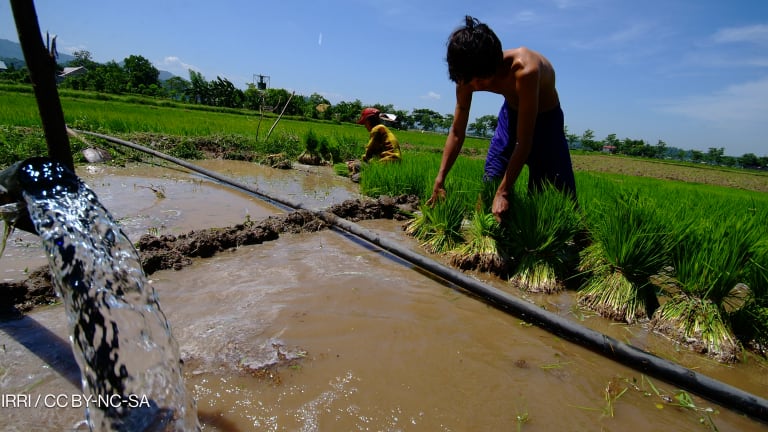Full sanitation in rural areas is a century away, warn expert groups

BARCELONA — Water, sanitation, and hygiene heavyweights are warning that without increased investment for rural sanitation services, universal access to safely managed sanitation won’t become a reality until the next century — let alone 2030.
In a global call to action, the expert groups called for governments, donors, and development partners to step up their investments and efforts. Despite recent gains, they say significant barriers remain to improving access to clean water and safe sanitation services in rural areas.
“Often a crisis has to happen before some serious action is taken.”
— Susana Smets, senior water supply and sanitation specialist, the World BankHistorically, rural sanitation hasn’t had a lot of political support, said Susana Smets, senior water supply and sanitation specialist at the World Bank, in part because household sanitation is seen as a private issue. “But the evidence tells us it is a public good and therefore justified as a service that governments have a responsibility for,” she explained.
Of the 2 billion people lacking access to basic sanitation worldwide, 72% live in rural areas, yet donor spending on rural sanitation dropped between 2015 and 2017.
The groups behind last month’s call to action — including the World Bank, SNV Netherlands Development Organisation, UNICEF, WaterAid, Plan International, and the Water Supply and Sanitation Collaborative Council — say good sanitation and hygiene must become a political priority.
“Often a crisis has to happen before some serious action is taken,” Smets said. In 2009, a massive outbreak of cholera in Nepal sparked the prioritization of WASH in the national development agenda. In September this year, the country was declared as open defecation free.
There has been an imbalance of funding when it comes to urban versus rural sanitation programs, said Jamie Myers, a research officer for the Community-Led Total Sanitation Knowledge Hub, which is working on an innovative method for mobilizing communities to eliminate open defecation, at the Institute of Development Studies.
“If we’re committed to ensuring we leave no one behind and getting everyone to safely managed sanitation by 2030, we can’t all run toward urban and forget there’s going to be people living in extreme poverty in rural areas for many decades to come,” Myers said.
Of the 90 countries with national plans for rural sanitation, only 7% report having enough financial resources to implement them, compared to 15% for urban plans.
Smets said the rural sanitation programs that have been funded in the past also tended to focus on building toilets rather than behavior change. That has led to poor uptake of the toilets that have been built, making rural sanitation an unattractive proposition for donors. “Who wants to back a program where results have been mixed?” she asked.
But better programming could overcome that problem. “Merely providing toilets does not guarantee their use, nor does it result in operation and maintenance of facilities or getting to improved sanitation and hygiene services,” Myers noted.
And change is possible, said Antoinette Kome, global sector coordinator of WASH at SNV. Despite starting from a very low baseline — and being a low-income country facing earthquakes and insurgencies — Nepal was able to make progress.
“What really made a difference in Nepal was alignment,” Kome said, explaining that in 2006 and 2007 there were numerous ministries and development organizations implementing their own approaches. Once there was a joined-up approach, progress could be made.
Myers also pointed to government ownership and context-specific programming as key.
But advocates stress that the onus isn’t just on implementers. As well as more money, Smet said they want to see program funders shift to a longer-term view and allow for innovation around sanitation services — for example through the use of water ATMs, smart water pumps, and water-seal latrines to provide access to clean water and safely managed sanitation in rural areas.
Search for articles
Most Read
- 1
- 2
- 3
- 4
- 5








